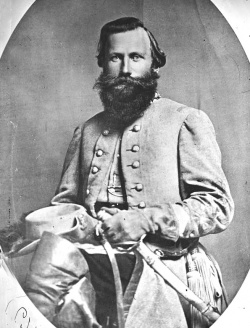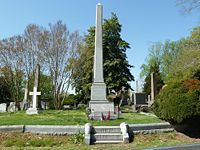J.E.B. Stuart
|
James Ewell Brown Stuart (1833-1864) - Born 6 Feb 1833, Patrick County, Virginia. Died 12 May 1864, Richmond, Virginia.  A West Point graduate who served in the Indian Wars and the U.S. Civil War for the Confederate States of America (CSA). He was a Cavalry officer who rose to the rank of Major General before his death in 1864 from wounds received in battle. Early YearsAt the age of 14 James Stuart was placed at school in Wytheville; and in August, 1848, he entered Emory and Henry College. In Apr 1850 he obtained an appointment as cadet in the United States Military Academy at West Point, on the recommendation of the Congressman T. H. Averett, of the Third District of Virginia. West PointStuart applied himself at West Point and graduated 13th of 46 in the Class of 1854. He held the cadet offices of corporal, sergeant, orderly sergeant, captain of the second company, and cavalry sergeant; the last being the highest office in that arm of the service at the Academy. Indian WarsJ.E.B. Stuart, then a second lieutenant was posted to Fort Clark (1), Texas, in December, 1854, and continued there until 8 May 1855 with the Mounted Riflemen Regiment. In the spring of 1855 the 1st U.S. Cavalry Regiment and 2nd U.S. Cavalry Regiment were organized by Jefferson Davis, who was at that time Secretary of War. Stuart was transferred to the 1st U.S. Cavalry Regiment with the rank of second lieutenant. Stuart was involved in capture of John Brown at Harpers Ferry while in Washington D.C. on other business. He volunteered as aid to Col. Robert E. Lee who was charged with suppressing the insurrection and was involved in the negotiations for surrender. After the incident was closed he returned to his post at Fort Riley and moved in the summer of 1860 to establish Fort Lyon where the regiment wintered. U.S. Civil WarIn March, 1861, Stuart took two months' leave of absence while waiting to see if his native State of Virginia would leave the Union. Returning to Fort Riley, he learned that Virginia had passed the ordinance of secession. His leave of absence had not yet expired, and he moved his family to St. Louis, and took passage on a river steamboat for Memphis. When the boat landed at Cairo, Stuart forwarded to the War Department his resignation as an officer in the United States Army. Almost immediately thereafter he received the notification of his promotion to Captain in his regiment. On the 7th of May he reached Wytheville, Virginia, and on the same day his resignation was accepted by the War Department. He proceeded to Richmond and offered his sword in the defense of Virginia. His first commission in the Southern army was that of Lt. Col. of infantry, dated May 10, 1861, with orders to report to Colonel T. J. Jackson, at Harper's Ferry. This commission was issued by the State of Virginia. On July 16, 1861, he received from the same source his commission as colonel of cavalry. On the 24th of September of the same year he was made brigadier-general by the Confederate States' government, and on July 25, 1862, he was commissioned major-general by the same authority. Stuart led his regiment in the battle of 1st Bull Run and participated in the pursuit of the routed Federals. Besides leading the cavalry in the Army of Northern Virginia's fights at the Seven Days, 2nd Bull Run, Antietam, Fredericksburg, Chancellorsville, Gettysburg, and the Wilderness, Stuart was also a raider. Twice he led his command around McClellan's army, once in the Peninsula Campaign and once after the battle of Antietam. In a later Confederate raid, Stuart overran Union army commander Pope's headquarters and capture his full uniform and orders that provided Lee with much valuable intelligence.  At Chancellorsville he took over command of his friend Stonewall Jackson's Corps after that officer had been mortally wounded by his own men. Returning to the cavalry shortly after, he commanded them in the largest cavalry engagement ever fought on the American continent, Brandy Station, on June 9, 1863. During the Gettysburg Campaign Stuart again circled the Union army, but in the process deprived Lee of his eyes and ears while in enemy territory. Arriving late on the second day of the battle, Stuart failed the next day to get into the enemy's rear flank, being defeated by Generals Gregg and Custer. During Grant's drive on Richmond in the spring of 1864, Stuart halted Sheridan's cavalry at Yellow Tavern on the outskirts of Richmond on May 11. In the fight he was mortally wounded and died the next day in the Richmond. He was buried in Hollywood Cemetery in Richmond.
Father: Archibald Stuart (1795-1855) Born 2 Dec 1795, Lynchburg, Virginia. Died Sep 1855,Laurel Hill Plantation, Patrick, Virginia. Mother: Elizabeth Letcher Pannill (1801-1884) Born 4 Jan 1801, Pittsylvania, Virginia. Died Sep 1884, Saltville, Smyth, Virginia. Marriage:
Children:
Assignments:
Personal Description:
Links: Sources:
|